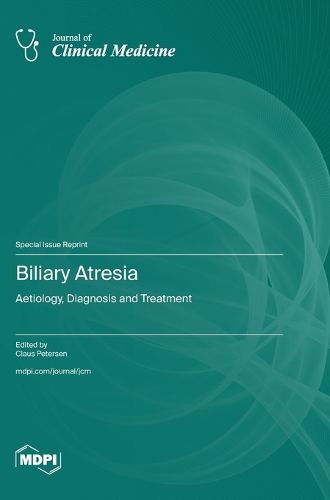Readings Newsletter
Become a Readings Member to make your shopping experience even easier.
Sign in or sign up for free!
You’re not far away from qualifying for FREE standard shipping within Australia
You’ve qualified for FREE standard shipping within Australia
The cart is loading…






This title is printed to order. This book may have been self-published. If so, we cannot guarantee the quality of the content. In the main most books will have gone through the editing process however some may not. We therefore suggest that you be aware of this before ordering this book. If in doubt check either the author or publisher’s details as we are unable to accept any returns unless they are faulty. Please contact us if you have any questions.
Despite extensive clinical and basic research, we know very little about the aetiology and pathomechanism of biliary atresia (BA). Today, it is a matter of common sense that early diagnosis (screening programs), sequential surgical treatment (the Kasai procedure and optional liver transplantation), and thorough follow-up in paediatric liver units improve survival rates among BA patients with native livers. However, BA still remains the most frequent indication of paediatric liver transplantation in patients with an unfavourable outcome after the Kasai procedure because the survival with native liver drops below 30% over the long term. Therefore, the following aspects should be considered alongside individual health issues: first, early organ replacement is a multifactorial burden for the growing organism, and second, every patient who survives with their native liver relieves the limited availability of donor organs and benefits national health expenditures with economic savings. From that point of view, international and interdisciplinary strategies are mandatory, in as much as BA is a rare disease. Over the past several years, national and international initiatives have been established in order to improve screening, centralization, diagnosis, as well as surgical and adjuvant treatment protocols. One such initiative is the recently launched European rare diseases network "rare-liver".
$9.00 standard shipping within Australia
FREE standard shipping within Australia for orders over $100.00
Express & International shipping calculated at checkout
This title is printed to order. This book may have been self-published. If so, we cannot guarantee the quality of the content. In the main most books will have gone through the editing process however some may not. We therefore suggest that you be aware of this before ordering this book. If in doubt check either the author or publisher’s details as we are unable to accept any returns unless they are faulty. Please contact us if you have any questions.
Despite extensive clinical and basic research, we know very little about the aetiology and pathomechanism of biliary atresia (BA). Today, it is a matter of common sense that early diagnosis (screening programs), sequential surgical treatment (the Kasai procedure and optional liver transplantation), and thorough follow-up in paediatric liver units improve survival rates among BA patients with native livers. However, BA still remains the most frequent indication of paediatric liver transplantation in patients with an unfavourable outcome after the Kasai procedure because the survival with native liver drops below 30% over the long term. Therefore, the following aspects should be considered alongside individual health issues: first, early organ replacement is a multifactorial burden for the growing organism, and second, every patient who survives with their native liver relieves the limited availability of donor organs and benefits national health expenditures with economic savings. From that point of view, international and interdisciplinary strategies are mandatory, in as much as BA is a rare disease. Over the past several years, national and international initiatives have been established in order to improve screening, centralization, diagnosis, as well as surgical and adjuvant treatment protocols. One such initiative is the recently launched European rare diseases network "rare-liver".